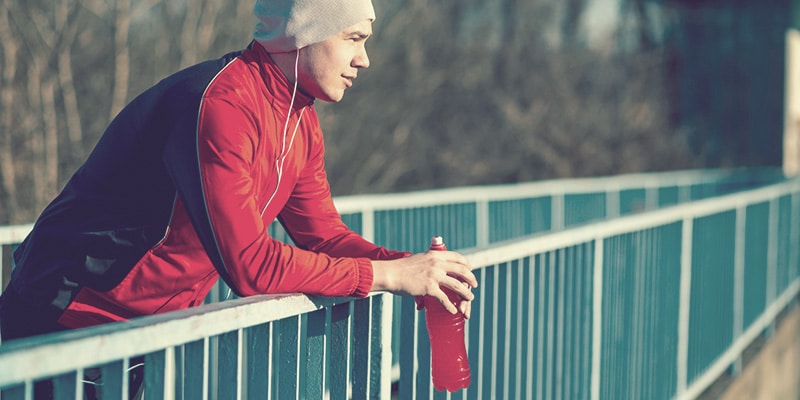When Do You Really Need Electrolytes?

We all remember the commercials. We get thirsty just thinking about them. Michael Jordan is schooling a younger version of himself on when to dunk, neon yellow sweat dripping from his brow as he chugs a cold, crisp Gatorade after facing his fiercest opponent. Or there’s the one with Dwayne Wade and a band of professional ballers, playing so hard that the pavement beneath their feet cracks, metal hoops bend to their will and splashes of purple, orange and blue perspiration fly as they play.
The message is clear. If you want to be the best, you need a sports drink that’s going to replenish the electrolytes lost during intense physical activity and keep you energized and ready to perform your best. But, do you really need some sweet, glowing drink to be a great athlete? Do electrolytes really matter? In short, yeah, they matter. They don’t have to come from some fruit punch-flavored, pre-packaged sports drink, but you definitely need them. Here’s why you need to make sure you’re hydrating with electrolytes and how to do it right.
Don’t Start Out Thirsty

Before you even think about going to the gym, you need to make sure you’re well-hydrated. This includes making sure your stores of electrolytes, components vital to your bodily functions, are full and ready to be unleashed during your workout. Electrolytes, according to Medical News Today, can include calcium, sodium and potassium, which are all necessary for muscle contraction. If you don’t have these at the beginning of your workout, you’re not going to get very far.
“Upon the onset of thirst,” says BodyBuilding.com, “an athlete is already 3 percent dehydrated, which reduces maximal performance capability by 15 percent.” If you don’t start out fully hydrated, you’re already behind.
Replenish Your Electrolytes Throughout Your Workout
You can’t neglect to hydrate yourself throughout your workout. There’s a fine balance between chugging (and subsequently upchucking) a gallon of fluids during a half marathon and making sure you’re getting adequate hydration, however. You need to find the right amount of sports drink or electrolyte infused water to keep you going without feeling like you’ve got it sloshing around in your system.
“The American College of Sports Medicine recommends drinking five to 12 ounces of fluid every 15 to 20 minutes of exercise,” says BodyBuilding.com. Bring a bottle with you into the gym and periodically stop to take a sip. “If the exercise bout is under an hour, water is an appropriate fluid replacement beverage. Beyond an hour, a sports drink containing a 7 percent concentration of carbohydrates will help enhance performance.”
This guideline provides a great baseline for mid-workout hydration, but your actual consumption of water or electrolyte fluids is going to be a bit more personal. You need to take into consideration, first of all, what type of exercise you’re doing. Someone training for an ultramarathon in the middle of Arizona in July is going to need to make sure they’re getting a lot more water (and sunscreen) than someone banging out a bunch of bench presses in an air conditioned gym.
You also need to recognize whether or not you’re a sweaty person. No judgement here. You just need to know if you sweat more than the average gym goer and, if you do, hydrate accordingly.
Hydrate When You’re Done

Most people know this one, but it bears repeating: make sure you hydrate and replenish your electrolytes after you’re done working out. This is even more important if your workouts last longer than an hour. “During longer workout sessions,” advises Greatist, “the plan for electrolyte replacement depends on a few factors.”
Greatist suggests that guys, who are generally sweatier than their female counterparts in the gym, need to be more concerned about their electrolyte replacement than women do. Larger athletes could require more electrolytes, especially sodium, than their tiny teammates. Intense exercise (think kickboxing or heated power vinyasa flow) is going to drain your electrolytes faster than leisurely exercise (a stroll in the park or 16 sit ups during Game of Thrones commercial breaks). Work hard, replenish hard.
For endurance athletes, a measure of how much to drink can come from weighing yourself before and after your activity. For every pound lost during exercise, consume 16 to 24 ounces of fluids.
Watch Your Electrolyte Sources
Sports drinks taste good. In fact, they kind of taste like Kool-Aid. That’s in large part because many sports drinks pack the same sugar and chemical punch that kids drinks can. That’s not the kind of source you want to get your electrolytes from, especially when there are plenty of healthier options for replenishing what you’ve lost during a workout.
Electrolyte-infused waters, like AQUAHydrate, can deliver even better results during your recovery from a workout than sugary sports drinks, without all the high fructose corn syrup. If you’re going to settle on a sports drink, make sure you check the label and know exactly what you’re putting into your body before you guzzle it. Performance Inspired Nutrition’s Post Workout BCAA supplement tastes great without all the chemical junk that a bottled sports drink brings with it. Plus, it contains BCAAs and glutamine to aid in muscle recovery. Just sayin’.
You can also find electrolytes in food sources, according to Active.com. Foods like chia seeds, kale and certain fruits and veggies can help you replenish your electrolytes after a workout. People don’t grab a banana after running a marathon for nothing. You can also reach for a cold coconut water for a post-workout pick me up.
Make sure you’re drinking enough of the right stuff, full of necessary electrolytes, before, during and after your workouts and you’ll be prepared to achieve more at the gym and feel better when you’re done. We can’t promise your sweat will glow and you’ll turn into Michael Jordan, but there’s only one way to find out.
You still don’t follow Performance Inspired Nutrition on Facebook, Twitter and Instagram? What are you doing? Click ‘like’ and ‘follow’ today for the best fitness information and inspiration, plus the latest on the highest quality sports nutrition in the game.


